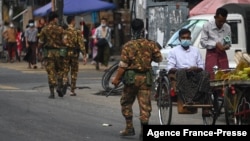Myanmar security forces are deploying large numbers of forces to crack down on dissident groups in various townships in Yangon, Myanmar’s largest city, as anti-coup forces continue to intensify attacks against military assets and affiliates.
A key member of the National League for Democracy, the party of ousted de facto leader Aung San Suu Kyi, and former member of the parliament, Phyo Zeyar Thaw, was arrested in Dagon Seikkan township Thursday (November 18).
The next day, the ruling junta released news of the arrest, with photos of Phyo Zeyar Thaw, handcuffed and with bruises on his face, amid guns and ammunition. It also released photos of 40 young men and seven women arrested between November 12 and 17, allegedly for carrying out terrorist attacks in Yangon under Phyo Zeyar Thaw’s direction.
The junta has accused Phyo Zeyar Thaw of recruiting youths at the behest of what it considers terrorist groups, such as the opposition shadow government, the National Unity Government, and the Committee Representing Pyidaungsu Hluttaw, consisting of elected MPs from last year’s 2020 general election.
A spokesman for the National Unity Government’s Military Command and Control Unit of Yangon Division said of the 47 detainees arrested by the military, 20 are members of the National Unity Government unit. Since the announcement of the National Unity Government's “People's Defensive War” on September 7, opposition forces have launched an “Operation Swallow” in Yangon and two neighboring regions of Bago and Ayeyarwaddy.
The National Unity Government military unit has claimed responsibility for shootings in several parts of Yangon and said there had been 443 attacks in Yangon between September 7 and November 6.
Aung Kyi Nyunt, chairman of the MPs group, expressed serious concern about the arrest of many young people, including Phyo Zeyar Thaw.
“They would be tortured under interrogation. They lives are at risk,” Aung Kyi Nyunt told VOA Saturday (November 20).
Four people were arrested Friday (November 19) in connection with the November 4 shooting death of Thein Aung, a high-ranking official of Mytel, a military-owned telecom company. Seven other men were arrested with weapons and ammunition, including two M16 rifles, for firing on a township administration office November 7.
The junta accused the opposition government and parliamentarians’ group of connection to the shootings, attacks and assassinations in Yangon, and the groups also have been accused of providing arms to young people involved in these attacks. Aung Kyi Nyunt would not comment on the military’s allegations.
The military has increased security in many townships and is conducting raids at night.
“After 8:00 at night, we do not dare to go out in our neighborhood. Soldiers are on the road, and [people] can be interrogated and arrested for no reason,” said a North Okkalapa township resident.
A total of 198 people were killed in terrorist attacks between February 1 and November 16, the junta announced on November 18. The junta reaffirmed it will crack down on those who create instability.
The junta also has warned that those who rent houses or apartments for members of the opposition military forces will be prosecuted under existing law and their property will be confiscated.
Opposition military forces say that despite the arrests, they will increase their efforts, and the command unit said it will be speeding up its operations in Yangon.
Kyaw Oo, a member of the opposition People’s Defense Force, who has been carrying out guerrilla attacks since April, told VOA his group received information in October that the junta would launch an operation in Yangon within three months.
“Since then, the military has put more security forces on Yangon than ever before. As a result, prominent people were targeted and arrested on missions. Later arrests may become more severe. So, now all the groups in Yangon are paying special attention to security. Otherwise, we will be arrested,” Kyaw Oo said.






